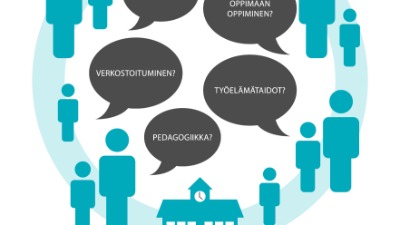Designing and developing flexible and digital learning environments
- Finland,The Province of North Karelia
- 2018

| Time frame | |
| Categories | |
| Level of Schools | |
| External Partners | |
| Type of Schools | |
| URL | |
| Number of Schools involved | |
| Number of Schoolheads involved | |
| Number of Teachers involved | |
| Number of Students involved | |
| Number of Parents involved | |
| Number of External Partners involved |
The project aim was to strengthen the regional competence and its fluent development. Learning environments were developed by creating new products and tools for the school projects produced by local business companies, and by organizing entrepreneurs' visits at schools. The business companies achieved new collaborators and innovations as well as customers and entrepreneurs also became known in the region through digital portal and dissemination activities.
The project aim was to strengthen the regional competence and its fluent development by fostering collaboration between local business companies and educational institutions in developing learning environments.
Using the results of the pilot projects the coordinators will create a website which offers a channel for cooperation between schools and business companies in the future.
Learning environments were developed by creating new products and tools for the school projects produced by local business companies, and by organizing entrepreneurs' visits at schools.
The business companies achieved new collaborators and innovations as well as customers. The entrepreneurs also became known in the region through digital portal and dissemination activities. On the other hand, the project increased the quality of education and collaboration between educational institutions. The project also strengthened this particular research and teaching area in teacher education at the University of Eastern Finland.
My previous company (Joensuu Science Education Service) was one of the companies and I found the collaboration with Loiste kindergarten very successful from the aspects of mutual learning and multidisciplinary networking.
Co-creation (e.g. painting the wall), socio-scientific issues (exploring different professions with children), problem-based learning (e.g. what changes are needed to decrease the noise in classrooms).
One subproject presented children how to use compost, while another made children familiar in making stick- figured animations and used them as manuscripts in their professional-related Green screen videos.
Furthermore, some children got a chance to participate in the design of “Forest room” by drawing.
The developing of schools learning environment offers a great chance for teachers to involve their pupils and students in different phases of the developing process. The project showed that even the children in preschools could participate in the decision-making or the assessment phase, for example, by playing, story- telling or drawing own ideas related to the project.
The University of Eastern Finland is famous for research and developing learning environments and can share this expertise to enhance cooperation with the local business and schools. However, the local business companies are known for their products and services offered to the kindergartens, and the school which gave a great opportunity to add to their current learning environment usage of arts or technology. The business companies learned pedagogical aspects of how to develop their services and products.
The ethical aspects rose from the visit of a sexual education company during a teacher student course. According to the educator, children learn early on that it is difficult to talk about intimate issues. From that starting point, the sex education company led the class teacher students to the topic of “What sexual education is like in primary education?”
For example, Joensuu Science Education Service is a one-person company, which owner was a teacher of Chemistry and Physics. The company had a partner in implementation, Science Education Hannu Partanen. Hannu is a teacher of in Mathematics and Physics.
The approaches in the subprojects included knowledge from several disciplines such as digital technology (e.
g. Green screen), visual arts (the wall painting) and biology (compost in one of the kindergarten).
The University cooperated closely with North Karelia educational institutions and the local business companies in practical and an advocacy level.
The school, the kindergartens and the companies, were all located in the Province of North Karelia. As said, the project strengthens the region's education and teachers' pedagogical capacity to develop and use learning environments that promote future skills.
The University of Eastern Finland was the coach and the supervisor of the implementations.
Children of Loiste kindergarten got familiar with Green screen technology and explored different workplaces by 360-degree images.
The communication seems to be successful. All the parties offered expertise to each other in issues when they just asked for help. I guess more companies could have been interested in participating in the project if they get a payment for participating.
Companies helped schools to develop new learning environments using companies’ products and services. At the same time, the collaboration between schools and companies strengthened, and the working life awareness of children rose.
The project models a way to promote institutional learning between companies, schools and universities while keeping the focus in children’s welfare and university students’ learning.
The University of Eastern Finland (4 university teachers from the School of Applied Educational Science and Teacher Education) is the main coordinator of the project, but the implementation team was formed from the local schools and business companies, which were ready to engage in the project without any pecuniary payment.
The coordinators interviewed students, teachers and the companies in the very end of the implementations.
